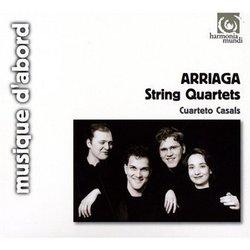| All Artists: Cuarteto Casals Title: Arriaga: String Quartets Nos. 1 - 3 Members Wishing: 0 Total Copies: 0 Label: Harmonia Mundi Original Release Date: 1/1/2009 Re-Release Date: 3/10/2009 Album Type: Import Genre: Classical Styles: Chamber Music, Historical Periods, Classical (c.1770-1830) Number of Discs: 1 SwapaCD Credits: 1 UPC: 794881909926 |
Search - Cuarteto Casals :: Arriaga: String Quartets Nos. 1 - 3
CD Details |
CD ReviewsWHAT MIGHT HE HAVE BECOME? DAVID BRYSON | Glossop Derbyshire England | 03/25/2009 (5 out of 5 stars) "Of the threescore years and ten that we are given authority to hope for, not even twenty came to Arriaga. He was still 19 and a student at the Paris Conservatoire when he died from `a condition of languor'. To my own best recollection, he started to interest the commentators about 40 years ago on account of his symphony, and I suppose that by now it has achieved the status of a standard classic. If you like the symphony, I'd hazard the guess that you will like the quartets as well. There are three of them, composed when he was 17 or 18, and they are `quality' stuff in much the way that the symphony is. The material and its working show taste, distinction and originality, the last in the sense that they are not unduly derivative. There is an odd sense that the composer is in a time-warp, and I attribute that sense simply to the fact that he was a pupil at Cherubini's Conservatoire. By date of birth he was actually closer to Wagner than to Schubert let alone Beethoven, but the idiom of the quartets suggests to me a kind of updated Haydn, and Haydn without the quirkiness at that.
These quartets are probably the work of a budding genius, at least of a certain kind. Two generations on, Max Bruch turned out his own quartets equally early, and they show more or less the identical virtues to Arriaga's. They are the work of a youthful master who had no problems in adapting or conforming to the system and whose creativity was not constrained or inhibited by it. Bruch went on to a long life, so we have the opportunity to ascertain what he amounted to. However it would be a gross error to equate Arriaga to Bruch or to anyone in particular on such a basis. The trouble with geniuses is that no two are really alike. All I should really say more is that you can expect to be impressed by these quartets, but don't expect miracles. Even miracles don't necessarily point the way forward when we do find them - Mendelssohn's Octet was also written at the age of 17, it is also no kind of radical or iconoclastic work despite being, inspirationally, a miracle of the hair-raising variety, but it remained to the end of his life the best piece of music on the full symphonic scale that he ever produced. May I take this opportunity to wish long happy healthy prosperous and fulfilled lives to the young members of the Cuarteto Casals, whose work I am encountering here for the first time. These quartets are doubtless not the greatest challenge they will encounter in the quartet repertory, but they give accounts of them that seem to me admirable in every way. Like Cicero I need not enumerate what these ways are, namely technical assurance, beauty of tone, appropriate sense of style, tempi well judged, depth of expression particularly in the beautiful slow movements, and above all a real sense of discovery and also a sense of affection. This is a disc I can recommend to any lover of good music without giving the recommendation a second thought. There is an interesting essay in the liner, together with brief resumes of the players - necessarily brief as theirs have so far been brief lives. The recording is from the new millennium, and it is to the quality standard we should demand, with a fine roomy effect surrounding the players. The packaging is rather attractive in its slimline format too. Obviously, I have been sidestepping my own question in my caption, and of course it was only a rhetorical question anyway. Cherubini's Conservatoire was a conservative sort of place, and all we have to judge Arriaga by is what he produced for Cherubini. Given a decent innings and some independence he would certainly have encountered some interesting people. The Conservatoire was about to have difficulties with a certain overdriven nuisance, three years older in fact than Arriaga was, by the name of Hector Berlioz. What their hypothetical interaction might have led to I have no way at all of even guessing. However it would be fair to assume at the very least that the bubble of the Haydn-hangover would have been burst firmly and for keeps." |

